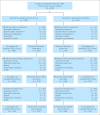L-carnitine supplementation for the management of fatigue in patients with cancer: an eastern cooperative oncology group phase III, randomized, double-blind, placebo-controlled trial
- PMID: 22987089
- PMCID: PMC3478577
- DOI: 10.1200/JCO.2011.40.2180
L-carnitine supplementation for the management of fatigue in patients with cancer: an eastern cooperative oncology group phase III, randomized, double-blind, placebo-controlled trial
Abstract
Purpose: L-carnitine, a popular complementary and alternative medicine product, is used by patients with cancer for the treatment of fatigue, the most commonly reported symptom in this patient population. The purpose of this study was to determine the efficacy of L-carnitine supplementation as a treatment for fatigue in patients with cancer.
Patients and methods: In this double-blind, placebo-controlled trial, patients with invasive malignancies and fatigue were randomly assigned to either 2 g/d of L-carnitine oral supplementation or matching placebo. The primary end point was the change in average daily fatigue from baseline to week 4 using the Brief Fatigue Inventory (BFI).
Results: Three hundred seventy-six patients were randomly assigned to treatment with L-carnitine supplementation or placebo. L-carnitine supplementation resulted in significant carnitine plasma level increase by week 4. The primary outcome, fatigue, measured using the BFI, improved in both arms compared with baseline (L-carnitine: -0.96, 95% CI, -1.32 to -0.60; placebo: -1.11, 95% CI -1.44 to -0.78). There were no statistically significant differences between arms (P = .57). Secondary outcomes, including fatigue measured by the Functional Assessment of Chronic Illness Therapy-Fatigue instrument, depression, and pain, did not show significant difference between arms. A separate analysis of patients who were carnitine-deficient at baseline did not show statistically significant improvement in fatigue or other outcomes after L-carnitine supplementation.
Conclusion: Four weeks of 2 g of L-carnitine supplementation did not improve fatigue in patients with invasive malignancies and good performance status.
Conflict of interest statement
Authors' disclosures of potential conflicts of interest and author contributions are found at the end of this article.
Figures
References
-
- Barnes P, Bloom B, Nahin R. Complementary and alternative medicine use among adults and children: United States. Nat Health Stat Rep. 2008;10:1–23. - PubMed
-
- Pekala J, Patkowska-Sokoła B, Bodkowski R. L-carnitine: Metabolic functions and meaning in human life. Curr Drug Metab. 2011;12:667–678. - PubMed
-
- Dodson WL, Sachan DS, Krauss S, et al. Alterations of serum and urinary carnitine profiles in cancer patients: Hypothesis of possible significance. J Am Coll Nutr. 1989;8:133–142. - PubMed
-
- Laviano A, Molfino A, Seelaender M, et al. Carnitine administration reduces cytokine levels, improves food intake, and ameliorates body composition in tumor-bearing rats. Cancer Invest. 2011;29:696–700. - PubMed
-
- Esteban-Cruciani NV. Severe carnitine deficiency in children with AIDS: Improved functional activity status after supplementation. Pediatr Res. 2001;49:254. (abstr)
Publication types
MeSH terms
Substances
Grants and funding
LinkOut - more resources
Full Text Sources
Medical


